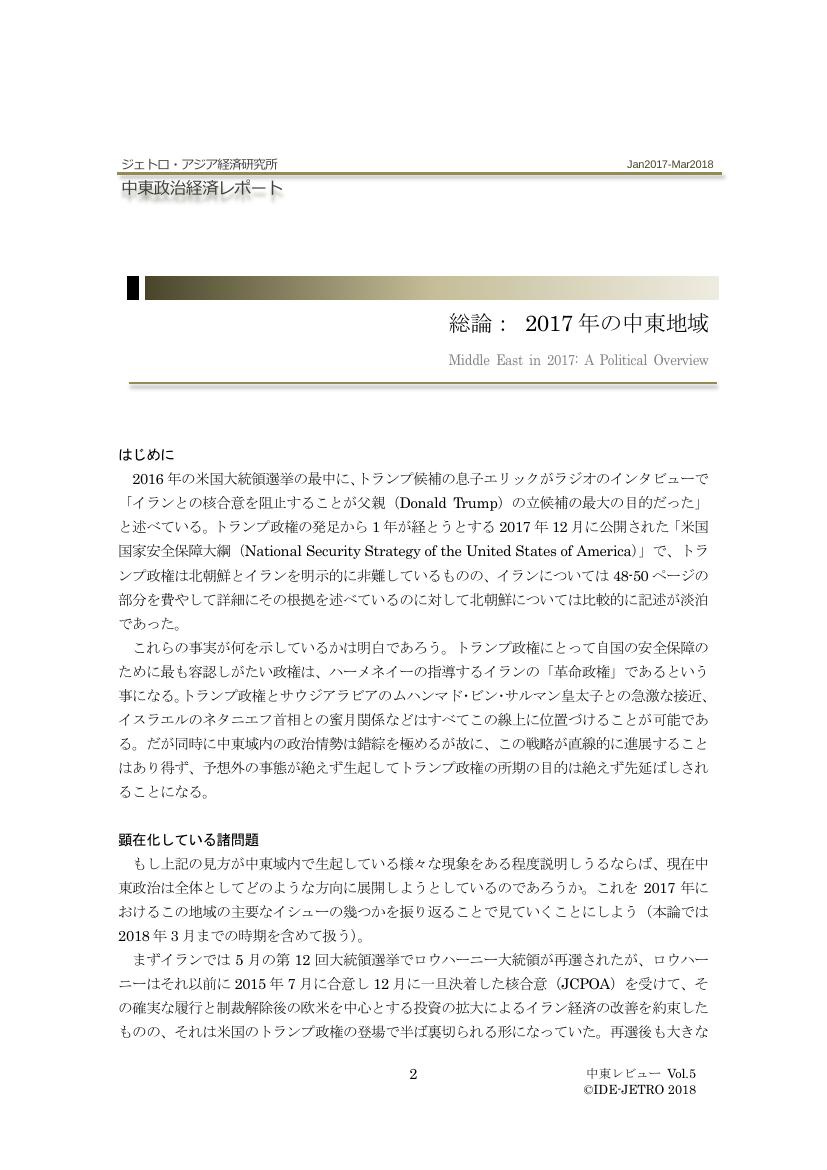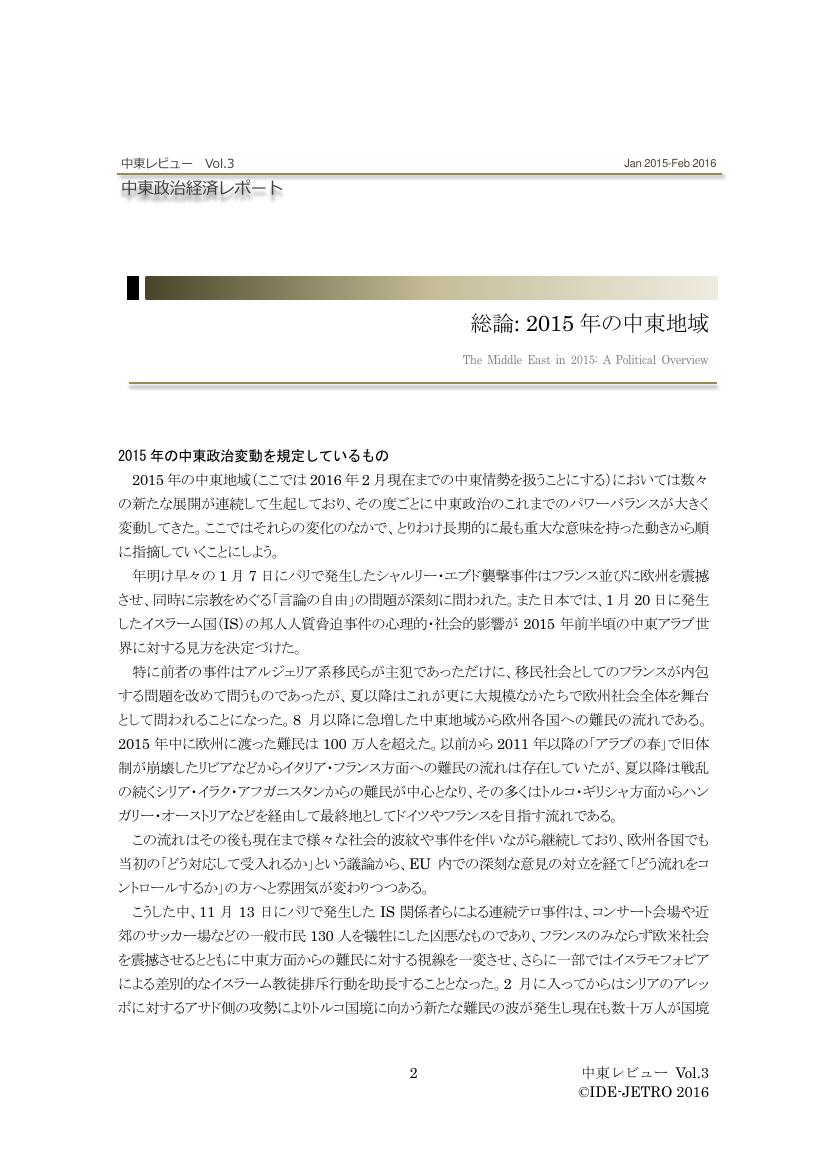3 0 0 0 OA エジプトの社会保障改革
- 著者
- 土屋 一樹
- 出版者
- 独立行政法人 日本貿易振興機構アジア経済研究所
- 雑誌
- 中東レビュー (ISSN:21884595)
- 巻号頁・発行日
- pp.Vol.7_J-Art02, (Released:2019-09-21)
- 参考文献数
- 26
Although Egypt’s social security system became obsolete in the 1990s, it was the Sisi administration that launched the major reform. The social security system was restructured along with the implementation of the bold macro-economic reform. As a result, the new social security plan can cover a much bigger population than what the old system could, despite a chronic fiscal deficit. The purpose of this paper is to examine the state of the social security reform in Egypt since 2014 and discuss its sustainability. The paper reviews the developments of the new cash transfer programs as well as the rebuilding of the social insurance system. While the new social security scheme is well-designed and is highly reputed, administrative capabilities will be a major challenge.
2 0 0 0 OA 2017年の中東地域
- 著者
- 鈴木 均 池内 恵 池田 明史 福田 安志 土屋 一樹 今井 宏平 高橋 理枝
- 出版者
- 独立行政法人 日本貿易振興機構アジア経済研究所
- 雑誌
- 中東レビュー (ISSN:21884595)
- 巻号頁・発行日
- vol.5, pp.2-48, 2018 (Released:2019-03-15)
1 0 0 0 OA エジプトの社会保障改革
- 著者
- 土屋 一樹
- 出版者
- 独立行政法人 日本貿易振興機構アジア経済研究所
- 雑誌
- 中東レビュー (ISSN:21884595)
- 巻号頁・発行日
- vol.7, pp.80-97, 2020 (Released:2020-03-27)
- 参考文献数
- 26
Although Egypt’s social security system became obsolete in the 1990s, it was the Sisi administration that launched the major reform. The social security system was restructured along with the implementation of the bold macro-economic reform. As a result, the new social security plan can cover a much bigger population than what the old system could, despite a chronic fiscal deficit. The purpose of this paper is to examine the state of the social security reform in Egypt since 2014 and discuss its sustainability. The paper reviews the developments of the new cash transfer programs as well as the rebuilding of the social insurance system. While the new social security scheme is well-designed and is highly reputed, administrative capabilities will be a major challenge.
1 0 0 0 OA スィースィー政権はエジプトに持続的成長をもたらすか
- 著者
- 土屋 一樹
- 出版者
- 独立行政法人 日本貿易振興機構アジア経済研究所
- 雑誌
- 中東レビュー (ISSN:21884595)
- 巻号頁・発行日
- vol.5, pp.94-108, 2018 (Released:2019-03-15)
Although Egypt has seen improved political stability and public order under the Sisi administration, the economy remains stagnant. The average economic growth rate during the first three years of Sisi’s presidency was 4.5 percent. More recently, Egyptians have suffered the highest inflation rates in decades due to the devaluation of the currency in November 2016. Will the bold economic reforms of 2016 lead to sustained economic growth for Egypt? This article argues the probability of reduced long-term economic growth prospects under the Sisi regime’s governance and economic policies.The Sisi administration has pursued a policy of social stability by restoring authoritarianism. The government has restricted citizens’ freedom of assembly, association, and expression through newly legislated undemocratic laws. As for the economic policy, its three main pillars include stabilizing the macro-economy, upgrading the social security program, and implementing ambitious infrastructure projects. While these policies are based on the standard market economy model, the military is now playing a critical role in economic activity more than ever before. That is, the Sisi regime has tried to control economic as well as political activities in an autocratic manner. Excessive military intervention in economic activity deters fair market competition, and, hence, innovation. As a result, Egypt cannot be expected to achieve sustained economic growth under the Sisi regime.
1 0 0 0 OA 総論:2016年の中東地域
- 著者
- 鈴木 均 池内 恵 池田 明史 土屋 一樹 今井 宏平
- 出版者
- 独立行政法人 日本貿易振興機構アジア経済研究所
- 雑誌
- 中東レビュー (ISSN:21884595)
- 巻号頁・発行日
- vol.4, pp.2-22, 2017 (Released:2019-11-12)
1 0 0 0 OA 総論(1): 2014年の中東地域/総論(2): 中東地域との経済関係の深化に向けて
- 著者
- 鈴木 均 岡田 江平 石黒 大岳 土屋 一樹 ダルウィッシュ ホサム 池田 明史 渡邊 祥子 内藤 正典
- 出版者
- 独立行政法人 日本貿易振興機構アジア経済研究所
- 雑誌
- 中東レビュー (ISSN:21884595)
- 巻号頁・発行日
- vol.2, pp.2-42, 2015 (Released:2019-12-07)
- 参考文献数
- 13
1 0 0 0 OA エジプトにおける軍の経済活動 ―スィースィー体制での役割―
- 著者
- 土屋 一樹
- 出版者
- 独立行政法人 日本貿易振興機構アジア経済研究所
- 雑誌
- 中東レビュー (ISSN:21884595)
- 巻号頁・発行日
- vol.2, pp.157-168, 2015 (Released:2019-12-07)
- 参考文献数
- 18
Since the second transition period started July 2013, the Egyptian armed forces have once again played a critical role in building a new political system. Although the Supreme Council of the Armed Forces (SCAF) had not come to the front this time, it controlled the transition process and succeeded in keeping the privileges of the military in both political and economic fields.This paper focuses on the economic role of the military under the regime of Abdel Fattah el-Sisi. Large scale economic activity of the military started in the mid-1970s. The military expanded its grip on the domestic economy and became one of the largest producers in Egyptian civil industry. In addition to controlling a huge business empire, the military under the Sisi administration is an entity supportive of national development goals. As the backer of the current regime, the armed forces have taken on a new responsibility as a central role player in economic development.
1 0 0 0 OA 総論: 2015年の中東地域
- 著者
- 鈴木 均 池田 明史 土屋 一樹 ダルウィッシュ ホサム 渡邊 祥子 猪口 相
- 出版者
- 独立行政法人 日本貿易振興機構アジア経済研究所
- 雑誌
- 中東レビュー (ISSN:21884595)
- 巻号頁・発行日
- vol.3, pp.2-32, 2016 (Released:2019-12-03)
1 0 0 0 OA 中東政治の変容とイスラーム主義の限界
- 著者
- 鈴木 均 内藤 正典 渡邊 祥子 ダルウィッシュ ホサム 石黒 大岳 齋藤 純 土屋 一樹
- 出版者
- 独立行政法人 日本貿易振興機構アジア経済研究所
- 雑誌
- 中東レビュー (ISSN:21884595)
- 巻号頁・発行日
- vol.1, pp.3-26, 2014 (Released:2019-12-21)
- 参考文献数
- 6




